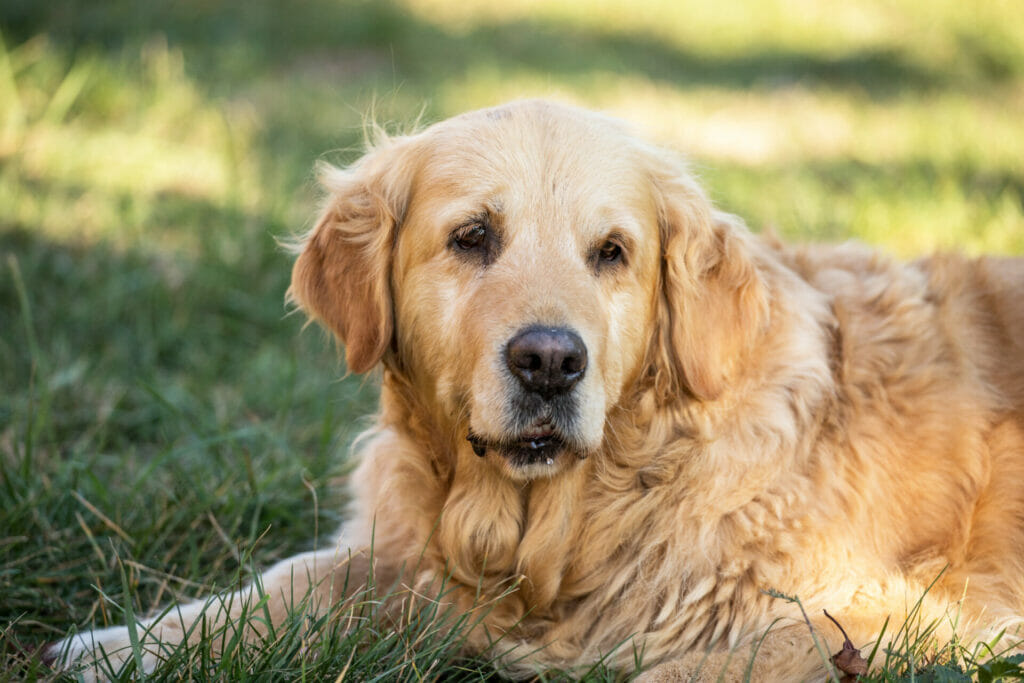As your senior dog gets older, they may experience behavioral challenges.
Whenever you notice behavioral changes in your dog, especially if they’re older, schedule an appointment with your dog’s veterinarian. Your dog’s vet will evaluate your dog and identify any underlying pain or more significant medical issues causing the behavior changes. Here are some common behavioral challenges that dog owners deal with as their dogs start to age.

Potty Accidents
Many senior dogs start to have potty accidents in the house. This behavior can be frustrating to dog owners who think their dogs are being naughty. In reality, your senior dog may not be able to “hold it” for as long. If your dog experiences a change in bathroom habits, consult a vet to check for conditions like a UTI. As long as your veterinarian has ruled out medical reasons, adjust your dog’s routine to ensure they go out as needed. If you need to be away for long periods of time, have a dog walker, friend, or family member help give your dog a chance to relieve themself. When you’re home, take your senior dog out more frequently for bathroom breaks. If your dog potties in the house, don’t scold or punish them. Instead, take it as a learning sign that your senior dog needs a different routine.
Excessive Barking
Another common behavior change with senior dogs is excessive barking. Barking could signify that your dog is in pain or has hearing loss. A vet’s opinion is always helpful. Excessive barking may mean your dog is more sensitive to the sights and sounds of your neighborhood. To address excessive barking, determine the trigger and then reduce access to those triggers. For example, if your senior dog doesn’t like delivery trucks in the neighborhood, close curtains or install window coverings on the lower parts of your windows to blog your dog’s view. You can also use treats, toys, and puzzle games to give your senior dog something to do instead of barking at triggers.
Change In Sleep
As a dog ages, they may experience disrupted sleep. Losing sleep can be challenging for everyone, so if your veterinarian has ruled out any health-related causes, there are steps to help your dog sleep easier at night. For example, create a bedtime routine for your senior dog to signify that it’s time to wind down. Make sure your dog has a comfortable place to sleep. If your senior dog is struggling with arthritis or other joint stiffness, explore an orthopedic dog bed to cushion. These beds support joints, help your dog sleep more soundly, and wake up less stiff. As senior dogs get older, they may not be able to go as long between potty breaks. To encourage a good night’s sleep, make sure to bring your dog out to potty right before going to bedtime.
Seeming Disoriented
Many senior dogs become disoriented in their homes or places that used to be comfortable. Look for signs of pacing, bumping into things, or overall confusion about people or places. If your dog seems disoriented, a visit to the vet may help determine any more significant underlying health conditions. If your vet has ruled out health conditions, help your dog find more comfort at home. For example, if your dog is more disoriented at night, utilize nightlights. Especially for dogs losing vision, extra light helps with navigating the home. Try minimizing significant disruptions in the house, such as rearranging furniture, if possible. If you do rearrange furniture, show your dog around the new layout. If your older dog becomes overwhelmed by people, offer them a quiet space to be with toys and treats whenever you’re entertaining.
Agitation or Aggression
A response in the form of lunging, barking, snapping, even biting, or other manifestations of aggression is not uncommon in senior dogs. Because of decreased vision and hearing, senior dogs are more easily startled. In turn, they may lash out when woken up or startled. The key to addressing aggressive behavior is understanding the triggers and then avoiding those situations. For example, reduce instances of aggression by reducing opportunities where your senior dog may be startled. If aggression does happen, consult with your veterinarian and an experienced dog trainer. Find someone who utilizes positive reinforcement training techniques to teach your dog new responses. Together, you’ll find strategies to keep your dog comfortable, and keep you and others safe.




















